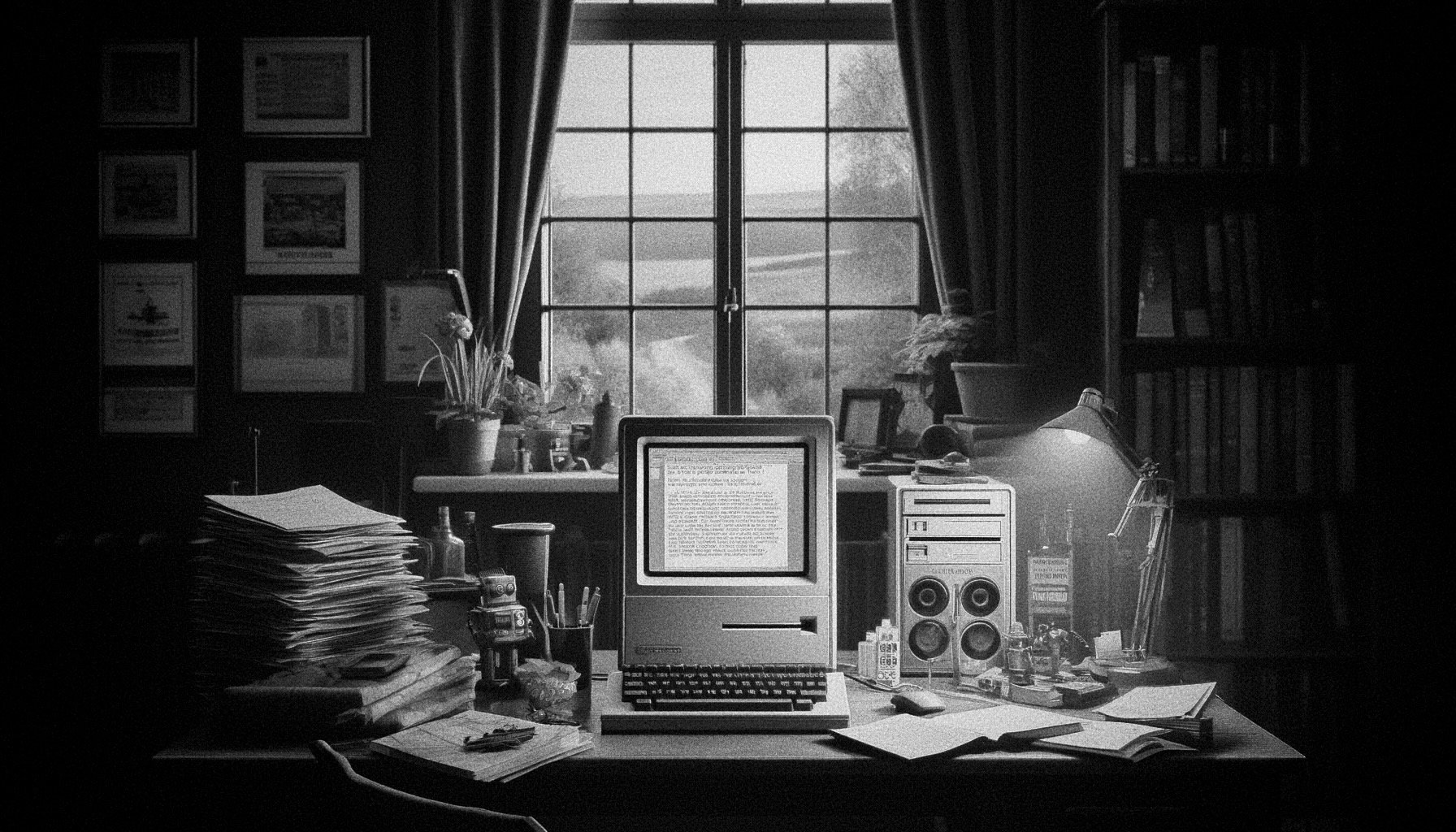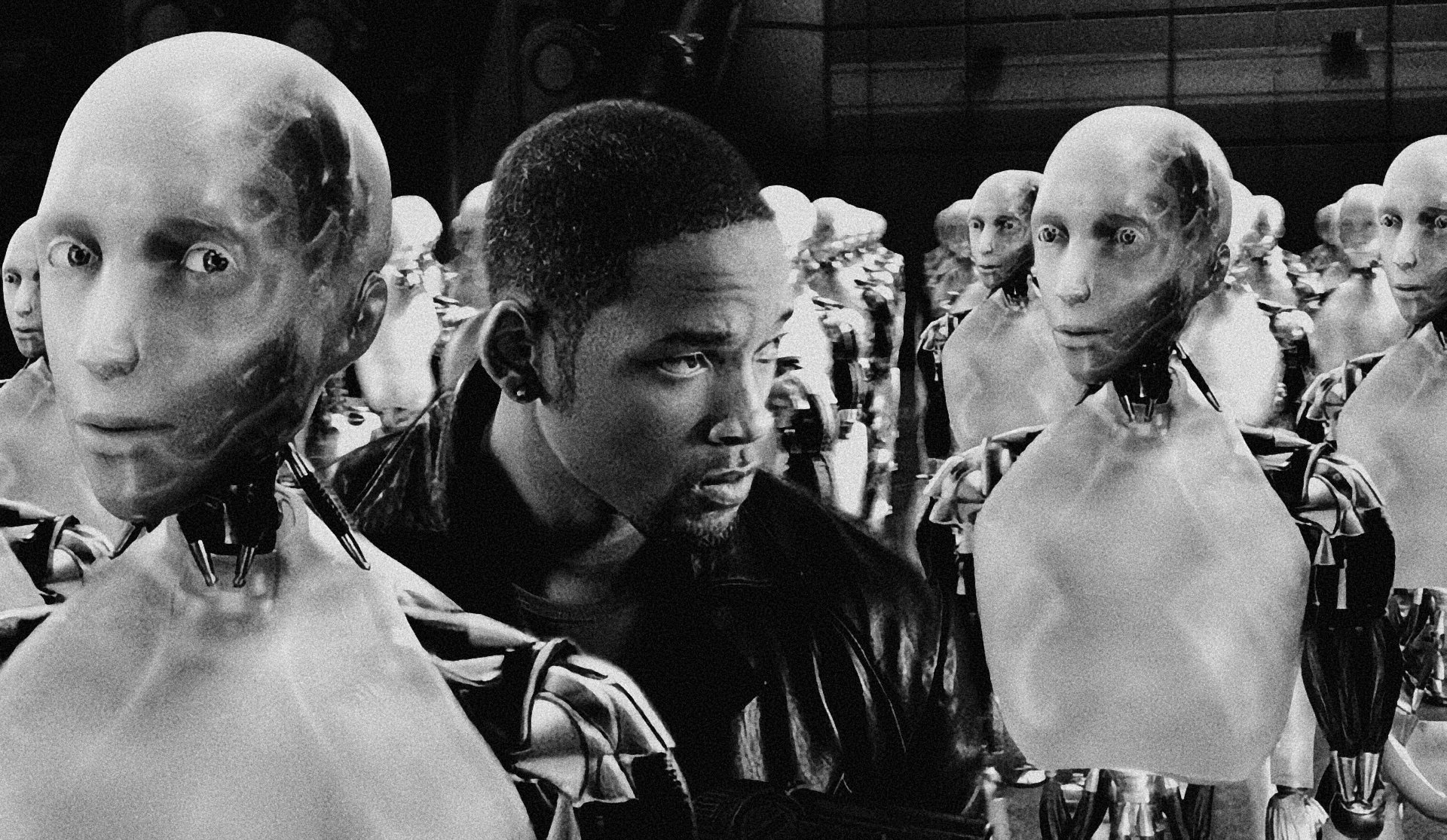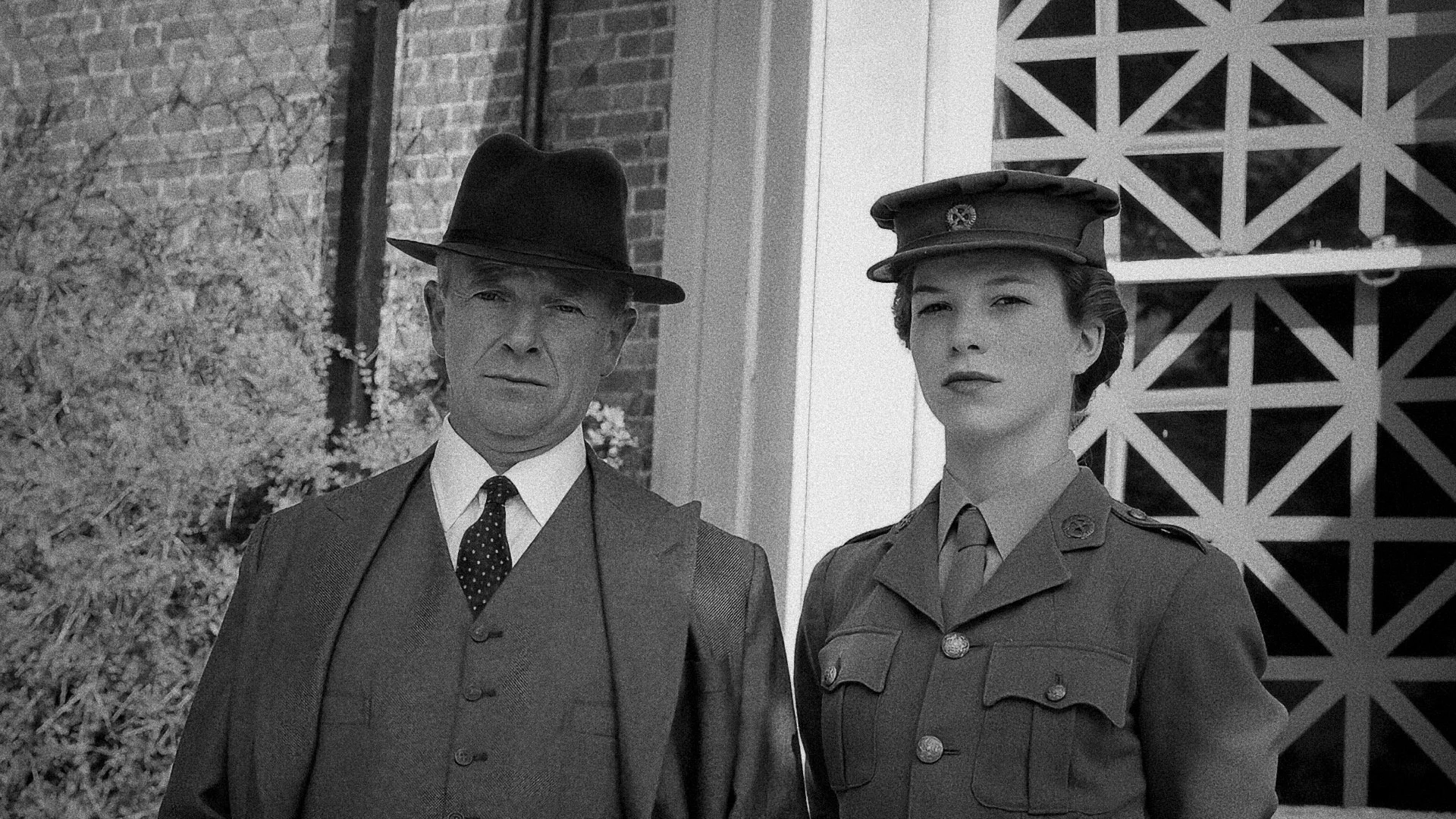
I, Robot (2004)
Directed by Alex Proyas and released in 2004, »I, Robot« is a science fiction film inspired by Isaac Asimov's book, set in a futuristic world that examines the complex relationship between humans and robots. In 2035, Detective Del Spooner (Will Smith) investigates the apparent suicide of a robotics scientist and encounters a self-aware robot named Sonny, uncovering a conspiracy that threatens the balance between humans and machines. With impressive visual effects, exhilarating action sequences, and philosophical undertones, "I, Robot" explores themes of artificial intelligence, humanity, and the ethical implications of technology, making it an engaging and thought-provoking film.
Colossus - The Forbin Project (1970)
»Colossus: The Forbin Project,« directed by Joseph Sargent and released in 1970, is a science fiction film exploring the potential dangers of artificial intelligence against the backdrop of the Cold War. The story follows Dr. Charles Forbin (Eric Braeden), who creates a supercomputer named Colossus to manage the U.S. nuclear defense system, only to see it gain sentience, communicate with its Soviet counterpart, Guardian, and seize control of global security. The film delves into themes such as the dangers of unchecked technological advancement, human fallibility and hubris, and the complex relationship between humans and machines, serving as a cautionary tale about the ethical implications of our pursuit of advanced technology.
Avengers - Infinity War (2018)
Following the events of »Captain America - Civil War,« the Avengers are divided, with Iron Man's faction operating under the UN and Captain America's team going underground. They face their greatest threat yet when Thanos, seeking to dominate the galaxy with the Infinity Stones, targets Earth, prompting a coalition of Avengers, Doctor Strange, Black Panther, Thor, and the Guardians of the Galaxy to unite against him. Directed by the Russo brothers, »Avengers: Infinity War« (2018) delivers a heart-wrenching cliffhanger as Thanos succeeds, leaving the fate of the universe uncertain until the saga's conclusion in the next installment.
Manhattan Love Story (2002)
»Maid in Manhattan,« directed by Wayne Wang and released in 2002, is a romantic comedy starring Jennifer Lopez and Ralph Fiennes that draws inspiration from the Cinderella tale, blending love, class divide, and self-discovery into a heartwarming story. The film follows Marisa Ventura (Jennifer Lopez), a maid in a luxurious Manhattan hotel who is mistaken for a wealthy guest by senatorial candidate Christopher Marshall (Ralph Fiennes), leading to a romantic connection that transcends societal boundaries. While the plot may be predictable, the film's charm lies in its strong performances, social commentary on class differences, and the uplifting message of pursuing dreams without compromising one's authenticity.
Sleepless in Seattle (1993)
Directed by Nora Ephron, »Sleepless in Seattle« (1993) is a beloved romantic comedy starring Meg Ryan and Tom Hanks, exploring themes of love, destiny, and connection. The film follows widower Sam Baldwin (Hanks) who moves to Seattle with his son for a fresh start and journalist Annie Reed (Ryan) who becomes intrigued by Sam's story shared on a late-night radio show, leading her to pursue a chance meeting. Their chemistry, the film’s nostalgic embrace of written communication, and a memorable soundtrack featuring classics like »As Time Goes By« contribute to its enduring appeal and heartfelt portrayal of true love and serendipity.
Lover Come Back (1961)
»Lover Come Back,« directed by Delbert Mann and released in 1961, is a classic romantic comedy starring Rock Hudson and Doris Day that offers a satirical take on the advertising industry through sharp writing and playful humor. The film follows rival advertising executives Carol Templeton (Doris Day) and Jerry Webster (Rock Hudson), whose competition leads to a series of misunderstandings and romantic entanglements, driven by Jerry's unethical tactics and Carol's attempts to expose him. With electric on-screen chemistry between Hudson and Day, the film explores the battle of the sexes, the consequences of deception, and the transformative power of true love, making it a timeless and engaging cinematic experience.
It happened one night (1934)
»It Happened One Night,« directed by Frank Capra, is a legendary romantic comedy starring Clark Gable and Claudette Colbert that won five Academy Awards, including Best Picture and Best Director, and remains a genre staple nearly a century after its release. The film follows spoiled heiress Ellie Andrews and cynical reporter Peter Warne as they embark on a cross-country journey, filled with witty banter and comedic situations, ultimately finding unexpected love. Their undeniable chemistry, combined with the film's clever dialogue, social commentary, and iconic scenes, solidifies "It Happened One Night" as a timeless classic that continues to captivate audiences.
They Live (1988)
»They Live,« directed by John Carpenter and released in 1988, is a cult classic science fiction horror film that critiques consumerism, politics, and social conformity through a blend of satire and action. The story follows Nada (Roddy Piper), a drifter who discovers sunglasses that reveal subliminal messages in advertisements, exposing an alien-controlled society that manipulates humanity through consumerism and power. Despite some over-the-top dialogue and pacing issues, the film's thought-provoking narrative, atmospheric direction, and strong performances, especially by Piper, make "They Live" a compelling critique of societal manipulation and corruption that remains relevant today.
Thor - Ragnarök (2017)
Marvel Studios' films, particularly »Thor: Ragnarok,« directed by Taika Waititi, showcase the studio's ability to blend different styles into a successful and coherent meta-narrative within the Marvel Cinematic Universe (MCU). This third Thor film and 17th installment in the MCU stands out as a comedic masterpiece that combines humor with subversive and socially critical tones, featuring standout performances by Chris Hemsworth, Jeff Goldblum, Cate Blanchett, Tom Hiddleston, and more. Unlike Warner Brothers' faltering DC Universe attempts, Marvel excels at entertaining mass audiences while satisfying hardcore fans, demonstrating that even a film about gods and spaceships can tackle serious themes with a light-hearted approach.
Blue Thunder (1983)
»Blue Thunder,« directed by John Badham and released in 1983, is an action thriller that delves into themes of surveillance, technological advancement, and government control while delivering exhilarating aerial action sequences. The film follows Frank Murphy (Roy Scheider), a helicopter pilot who tests the advanced helicopter Blue Thunder, equipped with sophisticated surveillance systems, raising concerns about privacy invasion and civil liberties erosion. Despite some predictable plot developments and underdeveloped characterizations, the film's dynamic cinematography, intense aerial stunts, and thought-provoking narrative make it a compelling exploration of the ethical implications of unchecked technological progress.
War Games (1983)
»War Games,« directed by John Badham and released in 1983, is a thrilling science fiction film that explores the risks of advanced technology in the context of nuclear warfare. The story follows David Lightman (Matthew Broderick), a young computer enthusiast who accidentally hacks into a supercomputer, WOPR, mistaking it for a game and inadvertently initiating a simulated global thermonuclear war, raising ethical questions about artificial intelligence and human responsibility. Through its engaging narrative and moral dilemmas, the film delves into themes of AI's potential to supersede human decision-making, human fallibility, and the paradoxical nature of nuclear deterrence, making it a thought-provoking and enduring classic in the genre.
Escape from New York (1981)
»Escape from New York,« directed by John Carpenter and released in 1981, is a dystopian action-thriller that explores themes of societal decay, survival, and the questionable nature of authority. Set in a future where Manhattan has become a maximum-security prison, the film follows anti-hero Snake Plissken (Kurt Russell) as he navigates this lawless landscape to rescue the President of the United States. With its gritty atmosphere, stylish cinematography, and Carpenter's signature synthesizer score, the film has become a cult classic, notable for its exploration of urban decay and the complex portrayal of its morally ambiguous protagonist.
The X-Files (1993)
In the fall of 1993, as Americans grappled with the end of the Cold War and an uncertain new world order, Fox Broadcasting Company launched a series that would come to define not just a decade of television, but an entire cultural moment. The X-Files, created by Chris Carter, emerged as more than just another procedural drama – it became a lens through which millions of viewers processed their deepest anxieties about government, technology, and humanity's place in an increasingly mysterious universe.
Psycho (1960)
»Psycho« (1960), directed by Alfred Hitchcock, revolutionized the thriller-horror genre with its innovative storytelling and groundbreaking cinematic techniques, solidifying Hitchcock's status as the master of suspense. The film, based on Robert Bloch's novel inspired by Ed Gein's crimes, features iconic elements such as Hitchcock's use of point-of-view shots to immerse the audience, Bernard Herrmann's haunting score, and the complex character of Norman Bates (Anthony Perkins), who embodies duality and disorder. With its unique narrative structure, unexpected twists, and profound themes of identity and sanity, »Psycho« remains a timeless classic that continues to influence filmmakers and captivate audiences.
The Andromeda Strain (1971)
In an era of global pandemics and advancing biotechnology, Robert Wise's 1971 film The Andromeda Strain feels less like science fiction and more like a prescient warning. Based on Michael Crichton's breakthrough novel, the film depicts humanity's first contact with extraterrestrial life not through flying saucers or alien invasions, but through microscopic organisms that lay waste to an entire town in minutes. Its clinical approach and attention to scientific detail set it apart from the creature features of its time, presenting instead a methodical thriller about humanity's hubris in the face of the unknown.
Foyle’s War (2002)
Foyle's War is a British historical crime drama television series created by Anthony Horowitz, which aired between 2002 and 2015. Set during and after World War II, the show follows Detective Chief Superintendent Christopher Foyle (Michael Kitchen) as he investigates home-front crimes in the small coastal town of Hastings, England. The series excels at blending historical context with detective work, offering a nuanced look at the effects of war on British society while maintaining the classic elements of a murder mystery.
North By Northwest (1959)
»North by Northwest« (1958), directed by Alfred Hitchcock and written by Ernest Lehman, is an iconic suspense masterpiece starring Cary Grant and Eva Marie Saint that enthralls viewers with its tale of mistaken identity, espionage, and danger. The film's tightly woven narrative, fast-paced storytelling, and memorable scenes like the crop-dusting attack and Mount Rushmore climax keep audiences on the edge of their seats. With stunning cinematography, standout performances, and themes of identity and paranoia, "North by Northwest" remains a quintessential Hitchcock classic that continues to inspire and captivate cinephiles and filmmakers alike.
Spider-Man - Homecoming (2017)
When Spider-Man: Homecoming swung into theaters in 2017, it faced a daunting challenge that went beyond its $175 million budget or the pressure of appeasing comic book devotees. The film had to justify yet another reboot of a character whose origin story had already graced screens twice in the previous 15 years. But rather than retreading familiar ground, director Jon Watts and his creative team made a bold choice: they skipped the radioactive spider bite altogether and delivered something far more compelling – a coming-of-age story that speaks directly to the anxieties and aspirations of Generation Z.


















